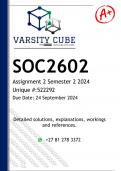SOC2602
Assignment 2 Semester 2 2024
Unique #:522292
Due Date: 24 September 2024
Detailed solutions, explanations, workings
and references.
+27 81 278 3372
, INTRODUCTION
Neoliberalism, a political and economic ideology that gained prominence in the
1970s, emphasizes market liberalization, deregulation, privatization, and the
reduction of state intervention in the economy. This ideology, often associated with
the expansion of modern capitalism, has shaped economic policies worldwide,
including in post-apartheid South Africa. While neoliberalism is hailed for promoting
economic growth and efficiency, its application in South Africa has led to increased
socio-economic disparities, exacerbating poverty, unemployment, and inequality.
This essay examines the main features of neoliberalism and its economic and
political effects in post-apartheid South Africa, focusing on issues of poverty,
inequality, and unemployment.
MAIN FEATURES OF NEOLIBERALISM
Neoliberalism is characterized by several core principles that advocate for a free-
market economy. One of its main features is the belief in the efficiency of markets
to allocate resources optimally. According to neoliberal thought, markets should be
free from government intervention, allowing supply and demand to dictate prices
and services (Harvey, 2005). This ideology promotes deregulation, where
governments reduce restrictions on businesses and industries to encourage
competition and innovation.
Another key aspect of neoliberalism is privatization, which involves transferring
ownership of state-owned enterprises to private entities. The rationale behind
privatization is that private companies, driven by profit motives, are more efficient
than government-run entities (Study Guide, 2018). Additionally, neoliberalism
advocates for a reduction in public spending on social services, such as healthcare,
education, and welfare, arguing that the private sector can provide these services
more efficiently.
Lastly, neoliberalism emphasizes globalization and the integration of national
economies into the global market. This integration involves removing trade barriers,
such as tariffs and import quotas, to encourage international trade and attract
foreign direct investment (FDI). However, while these features are intended to
Varsity Cube 2024 +27 81 278 3372




